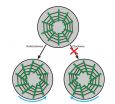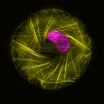Biology in a twist -- deciphering the origins of cell behavior
2015-03-31
(Press-News.org) Researchers at the Mechanobiology Institute (MBI) at the National University of Singapore have discovered that the inherent 'handedness' of molecular structures directs the behaviour of individual cells and confers them the ability to sense the difference between left and right. This is a significant step forward in the understanding of cellular biology. This discovery was published in Nature Cell Biology on 23 March 2015.
Cellular decision making
Our bodies are made up of hundreds of different types of cells, each of which performs a unique and highly specialized task. Traditionally, the ability of cells to specialize in a given function was attributed to its genetic code. However, it is becoming increasingly clear that cells do not simply live by a set of inherited or pre-determined instructions. Instead, 'cellular decisions' are made dynamically, much like humans make decisions based on the information provided to us by our senses.
Although cells do not have the ability to see or hear, they do possess sensory structures that allow them to detect and measure various environmental stimuli. The application of mechanical force to the cell, for example, will be felt and the cell will respond accordingly. One of the most prominent cellular responses is to change shape and this property is reflected in the varying shapes of specialised cells.
Cellular senses have been attributed to various force-sensing cellular structures such as the cytoskeleton. This structure differs significantly from its namesake, the human skeleton, by being highly dynamic and playing roles in addition to the provision of structural support. For example, this network of molecular filaments or cables also generates internal forces that drive shape changes and even motility. As the cytoskeleton develops, individual protein filaments grow and shrink. They bundle together to form thicker fibres, and they move or contract. Each of these processes is collectively known as 'cytoskeleton dynamics'.
The question that has long intrigued scientists is how cytoskeleton dynamics can direct the behaviour of different cell types. To investigate this, MBI researchers Professor Alexander Bershadsky and Dr Tee Yee Han, in collaboration with researchers from the USA and Israel, observed the cytoskeleton in cells that were confined to a small circular area, using a technique known as "micro-patterning". This prevented the cells from changing shape and thus provided the researchers an unhindered view of cytoskeleton dynamics.
A surprising find
What was detected came as a surprise to the researchers. A pronounced left-right asymmetry was observed during cytoskeletal organisation. This asymmetry, which appeared as a whirlpool, with filaments moving anticlockwise inside the cell, was found to originate from the inherent twist that is present in individual actin filaments. This helical twist occurs naturally as individual actin proteins join together to form the long actin cables that make up overall structure. This seemingly simple property has profound consequences as it suggests that the asymmetry of a single protein is translated to the asymmetric behaviour of a whole cell. This is akin to the twist of a screw or bolt directing the function or behaviour of the machine in which it is placed.
The ability of cells to distinguish between left and right is a phenomenon that continues to fascinate scientists. It is clear from this study that the asymmetry inherent in molecular structures can define the behaviour of whole cells, and this provides new insight into the ability of cells to 'make decisions' based on the mechanical properties of its environment. However, these findings also raise fascinating questions as to whether the same phenomenon can influence the formation and function of our organs, or even affect organism behaviour. Indeed relatively simple biological systems, such as cells grown on defined patterns, display a pronounced asymmetry in their movement. At the other extreme, brain function and human cognition is dependent on the asymmetric behaviour of nerve cells. The possibility that the inherent asymmetry of molecular structures can define cell, tissue or even organism behaviour will undoubtedly drive further studies for years to come.
INFORMATION:
[Attachments] See images for this press release:


ELSE PRESS RELEASES FROM THIS DATE:
2015-03-31
Researchers from the UK and Malaysia have detected a human fingerprint deep in the Borneo rainforest in Southeast Asia. Cold winds blowing from the north carry industrial pollutants from East Asia to the equator, with implications for air quality in the region. Once there, the pollutants can travel higher into the atmosphere and impact the ozone layer. The research is published today in Atmospheric Chemistry and Physics, an open access journal of the European Geosciences Union (EGU).
Rainforests are often associated with pure, unpolluted air, but in Borneo air quality ...
2015-03-31
WASHINGTON-- The Society for Public Health Education (SOPHE) proudly announces the publication of a Health Education & Behavior (HE&B) supplement devoted to the latest research and practice on policy and environmental approaches to foster healthy communities. The April 2015 supplement, "The Evidence for Policy and Environmental Approaches to Promoting Health," comprises a dozen peer-reviewed articles and two perspectives examining the state-of-the-evidence on what's working and what's needed at the community, institutional and societal levels to promote good health across ...
2015-03-31
A world first study revealing the presence of two antibodies in a sub-group of children experiencing their first episode of psychosis affirms a longstanding recognition that auto-immune disorders play a significant role in psychiatric illness.
Antibodies defend the body against bacterial, viral, and other invaders but sometimes the body makes antibodies that attack healthy cells. In these cases, autoimmune disorders develop. These include conditions such as multiple sclerosis (MS), rheumatoid arthritis and Type 1 diabetes.
This 'immune hypothesis' is supported by new ...
2015-03-31
Almost every pig carries harmless strains of the S. suis bacterium - such strains are known as 'commensal' strains. However, a more virulent group of strains of the bacteria also exist, which cause disease in pigs worldwide and are a major driver of antibiotic use for prevention. Increasingly, this group of strains is also implicated in serious human diseases such as meningitis and septicaemia.
In order to understand the genetic basis of disease in S. suis, an international study, led by the Bacterial Respiratory Diseases of Pigs-1 Technology (BRaDP1T) consortium, examined ...
2015-03-31
New research from the University of Toronto has scientists re-thinking how a lethal fungus grows and kills immune cells. The study hints at a new approach to therapy for Candida albicans, one of the most common causes of bloodstream infections.
Previously, scientists thought that Candida albicans spread by changing from a single, round cell to a long string of cells, or filaments. They thought this shape change allowed the fungus to move through the bloodstream and let its filaments penetrate tissues and destroy immune cells.
But the new study, published today in Nature ...
2015-03-31
Survey responses from 19,000 people in 18 European countries, including the UK, showed that "the notion that big welfare states are associated with widespread cultures of dependency, or other adverse consequences of poor short term incentives to work, receives little support."
Sociologists Dr Kjetil van der Wel and Dr Knut Halvorsen examined responses to the statement 'I would enjoy having a paid job even if I did not need the money' put to the interviewees for the European Social Survey in 2010.
In a paper published in the journal Work, employment and society they ...
2015-03-31
PISCATAWAY, NJ - Children who get a taste of their parents' wine now and then may be more likely than their peers to start drinking by high school, according to a new report in the Journal of Studies on Alcohol and Drugs.
Researchers found that, of 561 students in a long-term study, those who'd "sipped" alcohol by sixth grade were five times more likely than their peers to down a full drink by the time they were in high school. And they were four times more likely to have binged or been drunk.
The findings do not prove that early sips of alcohol are to blame, said lead ...
2015-03-31
Philadelphia, PA, March 31, 2015 - Ultrasound technology has evolved dramatically in recent years. A group of noted obstetricians and gynecologists maintain that ultrasound is more cost-effective and safer than other imaging modalities for imaging the female pelvis and should be the first imaging modality used for patients with pelvic symptoms. Writing in the American Journal of Obstetrics & Gynecology and supporting an American Institute of Ultrasound in Medicine (AIUM at http://www.AIUM.org) initiative, they urge practitioners to "put ultrasound first."
In 2012, the ...
2015-03-31
As the United States faces transplant waiting lists that continue to grow longer over time, there is increasing debate about the proper way to incentivize living donations. Transplant professionals are trying to find ways to eliminate any financial disincentives without crossing the line to paying for organs. A new article published in the American Journal of Transplantation highlights possible solutions discussed by leaders within the American Society of Transplantation (AST) and the American Society of Transplant Surgeons (ASTS) at a recent workshop.
Due to organ shortages, ...
2015-03-31
This news release is available in French. In addition to their physical injuries, women who are victims of domestic violence are also at a greater risk of mental health problems such as depression and psychotic symptoms. These are the findings of a study that was just published by a team of researchers at the Institute of Psychiatry, Psychology & Neuroscience at King's College London in England, the Institut universitaire en santé mentale de Montréal (IUSMM), and the University of Montreal.
"We studied the impact of domestic violence on the risk of mental ...
LAST 30 PRESS RELEASES:
[Press-News.org] Biology in a twist -- deciphering the origins of cell behavior


